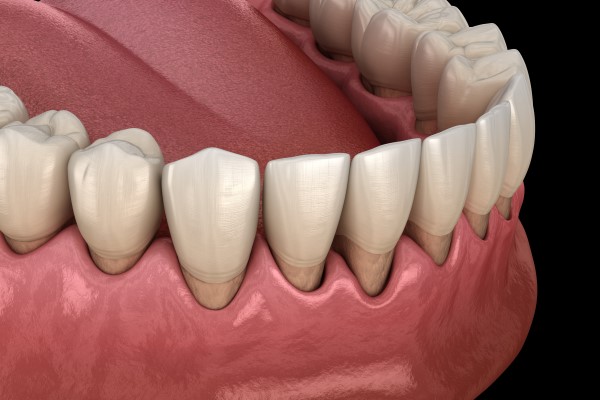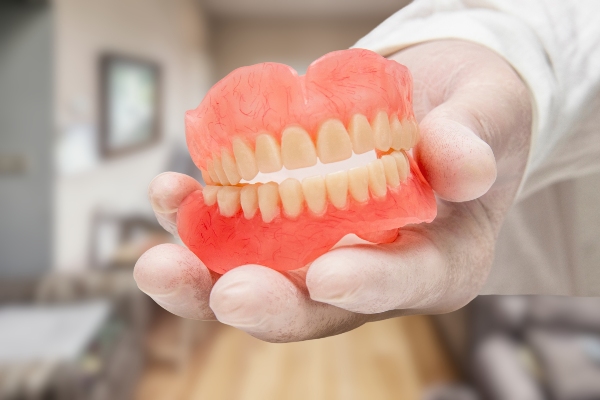When You Should See a Dentist About Receding Gums

The National Institutes of Health conducted a survey about receding gums. The results show that half of the adults in America have at least one area of gum recession. This study shows how prevalent this condition is, yet many people do not know when to seek treatment. Additionally, many people do not understand the factors that contribute to the development of gum disease, how gum disease can contribute to poor overall health, and why gum disease should be addressed as early as possible.
When unaddressed, receding gums can contribute to pain, sensitivity, and the loss of teeth in severe cases. Many factors can cause gum recession, including gum disease, orthodontic treatment, and brushing with a hard-bristled toothbrush. Medical conditions such as diabetes, hormonal issues, immune deficiencies, and genetics may play a part in the development of gum recession as well. Patients must understand signs of receding gums and know when to visit a dentist. Fortunately, there are several treatments for receding gums that can potentially save your teeth from further issues.
3 signs a patient needs treatment for receding gums
There are a few obvious indicators that a patient has receding gums. Some of these symptoms are visual and can be easily seen by the patient, while others are only detectable upon examination by a dentist. The condition may be localized to one area of the mouth, or it may be widespread. When patients notice any of the following symptoms, they should consult with a dentist.
1. Sensitive teeth
One of the first signs of gum recession is teeth sensitivity. Patients may notice an uncomfortable sensation when drinking anything cold or when the air hits the teeth. This symptom comes on slowly and worsens over time. It is important to note that receding gums are not the only cause of sensitive teeth, but if you are not sure why your teeth are bothering you, it is a good idea to make an appointment with your dentist to determine the cause.
When gums recede, they expose the root of the tooth. This tooth layer is much more porous than enamel, making it extra responsive to temperature changes. To treat sensitivity caused by receding gums, dentists may recommend certain kinds of toothpaste or mouthwashes. In severe cases, a dentist may place a filling over the root surface. Alternatively, the patient may undergo a gum grafting procedure to cover the recessed areas.
2. Cavities at the gum line
Not only is the root layer of the tooth more sensitive than enamel, but it is also softer. Therefore, decay forms more quickly in this area of the tooth. Patients may notice dark spots at the gum line and should have these evaluated by a dentist. Do not assume that your tooth is simply stained as you may be overlooking a forming cavity in this vulnerable area.
In the early stages, treatment for these cavities is simple. To address these cavities, a dentist places a tooth-colored filling. To prevent further decay, the dentist may recommend gum grafting for any other susceptible areas of recession. Your plan will depend upon your overall oral health as well as the current state of your gum recession.
3. Loose teeth
A significant contributor to receding gums is periodontal disease, which is also known as gum disease. This condition destroys the tissue and bone supporting the teeth. In moderate to advanced stages of the disease, gums pull away from the teeth, which can cause tooth mobility. Many patients are not aware they have the disease until a moderate or advanced stage.
To treat periodontal disease, dentists and hygienists perform a treatment known as scaling and root planing. This procedure disrupts the disease-causing bacteria beneath the gums, allowing the gums to reattach to the teeth. Treatment cannot fully reverse the destruction caused by gum disease. Instead, the goal is to halt the further progression of the disease. It is crucial to closely monitor this condition with the aid of an experienced dentist.
Conclusion
While receding gums may not cause noticeable symptoms or aesthetic concerns for patients in the beginning stages, the condition can progress rapidly. Unfortunately, it may be impossible to reverse the damage caused by periodontal disease or other causes of gum recession if you do not treat it from the beginning.
Patients should seek treatment for gum recession as soon as possible. This condition is easiest to treat in the early stages. For those needing care for receding gums, set up a consultation with a dentist today. In the meantime, practice healthy habits such as brushing and flossing twice a day, reducing sugar in your diet, and avoiding foods and drinks that bother your gums.
Request an appointment here: https://brimhalldentalgroup.com or call Brimhall Dental Group at 6612491122 for an appointment in our Bakersfield office.
Check out what others are saying about our dental services on Yelp: I Think My Gums Are Receding in Bakersfield, CA.
Recent Posts
Gum disease is a common yet serious condition that negatively impacts oral health if left untreated. The condition can result from plaque and bacteria buildup, starting with mild symptoms and leading to tooth loss. Knowing the stages of gum disease and when to seek treatment can help protect your gums and teeth.Gum disease, or periodontal…
Most people have experienced seeing red on the bristles of their toothbrush, or a pink tint in the sink when they expectorate after brushing. It is normal to feel a bit of concern when noticing blood in the mouth because bleeding gums are a symptom commonly associated with gum disease. However, while chronic bleeding gums…
Gum disease starts with the growth of bacteria in the mouth. When brushing or flossing does not remove this bacteria, harmful plaque accumulates and hardens into tartar. The collection of tartar along the gum line results in gingivitis, which can worsen into periodontal disease. Symptoms of this disease can be mild in the early stages,…
Gum disease may be reversed if caught early on; however, this is not the case as the condition advances. Read on to learn more about this oral health condition. Patients need to learn to watch out for signs of gum disease and go for general dentistry treatment. However, it may be helpful to know that…


